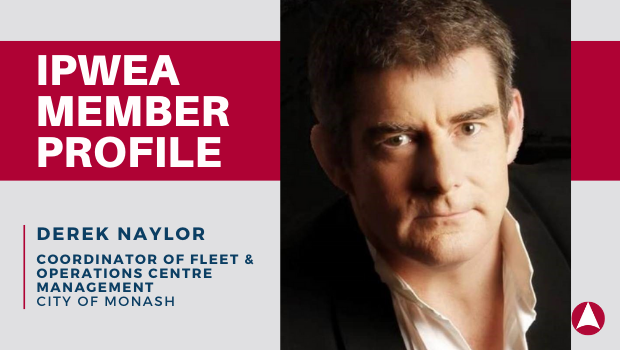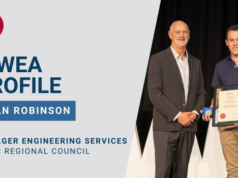COVID-19 has made living and working in Melbourne difficult for everyone, regardless of their industry. But it’s been particularly challenging for those in ‘essential services’, such as the City of Monash’s Coordinator of Fleet and Operations Centre Management, Derek Naylor.
Derek and his team of eight have worked throughout lockdowns to keep the municipality mobile. His team procures, maintains and disposes all plant equipment, with around 750 items on the register, ranging from combination drainage trucks to chainsaws.
“We also manage our operations centre, servicing hundreds of personnel, with our capital renewal and replacement program worth around $3 million per year,” says Derek.
Aside from his usual job, Derek and his team have picked up many additional duties to support council operations as they respond to the pandemic, such as procuring medical personal protective equipment, sanitiser and even barriers for pop-up outdoor dining areas.
His role includes supporting the Monash SES with vehicle servicing and the preparation for the large rain events predicted as part of this year’s La Niña weather event, prefilling almost 1,000 sandbags. The municipality is home to more than 200,000 residents.
Overcoming unseen problems
The COVID-19 pandemic has brought significant challenges to fleet management, with delays of up to 14 months for new vehicles ordered to arrive from the US and Europe. This means they are having to maintain the ageing fleet well beyond its programmed disposal date. For example, a garbage truck and three tractors ordered in November 2019 are not due for delivery until February 2021.

The availability and range of vehicles across all asset classes has been diminished due to COVID-19 and promised new models are delayed, including electric- and hydrogen-powered vehicles. “Replacement programming now involves a crystal ball at times,” says Derek.
“We’ve had a 20 per cent budget reduction and will not be purchasing any new passenger vehicles in ’20-’21. Pre-COVID, we had a lot of pooled vehicles and vehicles transporting work crews. Now, to minimise the chance of cross-contamination, vehicles aren’t pooled, and there’s only one person per car.”
It’s been an immense task, with more than 40 vehicles retrieved from those working from home and redeployed to active teams. “The constant juggling of cars and people as teams return to work is keeping us very much on our toes,” he says.
Hold-ups in the supply chain have also extended beyond plant and equipment. Even replacement batteries have been difficult to source at times, with new expenses creating headaches for the team.
“It means we’ve had to be a lot more creative about what we replace and repair, thinking outside the box,” explains Derek. “Some of the businesses supporting us have closed, others have been shut, requiring us to do a lot more repairs and refurbishments in-house. It has reminded us of the importance of retaining in-house capabilities at a time outsourcing is considered the preferred model.”

Despite this, the change in City of Monash’s service delivery models and working from home has seen a drop in fuel consumption of around 15 per cent. More vehicles doing fewer kilometres is having a dramatic effect on the council’s whole of life costing and replacement programming.
“As service teams begin to return to work, they will capture some of the innovative ways they have delivered services over the past nine months and look to incorporate into ‘COVID-normal’ and beyond,” Derek says. “We will need to work closely with each team to ensure they have the appropriate vehicles, plant and equipment. A focus on mobility in all its forms will be key.”
Managing a changing work landscape
Reduced working hours and additional restrictions within the COVID-19 plan have placed significantly more work on his team – some haven’t had a break since March. “COVID fatigue is real, but regardless of whether someone has been working at home or the office, people are tired,” he says. “We need to look after our people who have kept things moving during these difficult times. While perhaps not frontline workers, many have been critical to supporting frontline workers. We owe them all a debt. Managing burnout and well-being has been, and will continue to be, critical.”
Finding appropriate, qualified staff continues to be difficult. The industry is becoming more diverse, requiring new specialist skill sets. “As an industry, we need to be accountable for our own future,” says Derek. “Apprentices and technicians are a key element of this, and we’re proud to support them.”

Despite the current environment, the broader objectives remain – including CO2 and lifecycle cost reductions, using alternative fuels and increasing safety. “The grey fleet poses some interesting challenges to find solutions that are effective at mitigating risk without imposing undue administration or cost on the organisation or individuals,” he adds.
What has helped him this year has been his membership of the IPWEA, which provides relevant information and networking opportunities in a consolidated forum. Access to online resources has been particularly beneficial when site visits and conferences haven’t been possible.
Outside of work, he has a passion for motorsport and trail-bike riding, when time permits. He’s also usually involved in some sort of renovation project at home, and loves spending time at home with his family, having recently become a grandparent.
Derek’s working life began as an apprentice fitter and turner with Holden, following a family tradition with 100 cumulative years of service. In the role, he was exposed to quality management, which led him to taking up a role at a management consultancy. He established his own consultancy in 2000, focusing on continuous improvement and quality management, before accepting the role with Monash City Council in 2018.
“When the opportunity came up to move into fleet management for a council, it meant I was able to bring all I had learnt together and apply it to an industry that I had started my working life in. Some things are just meant to be,” Derek says.
“There’s also something very fulfilling about working in local government and serving the community.”














